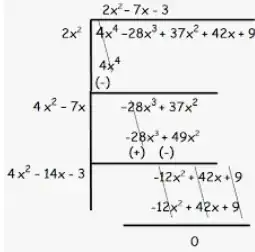I want to know how can we prove $\sqrt{n^2+1}$ is irrational. I know that when I use to find the square root of something by the long division method as suggested in the below image( it about some other expression and does not demonstrate my question but I attached the image to show the method of long division to find square roots.) and we get a remainder them it is irrational but I am not able to know why getting a remainder means irrational.
I want it to be opened because the duplicate suggested what I have already answered but not what I want to know, I want to know how can prove that $\sqrt{n^2+1}$ is irrational by the long division method used to find square roots.
I am talking about this me thod. Here it is used to find $\sqrt{4x^4-28x^3+37x^2+42x+9}$ This is just an example to show the method. My question is above the picture.
